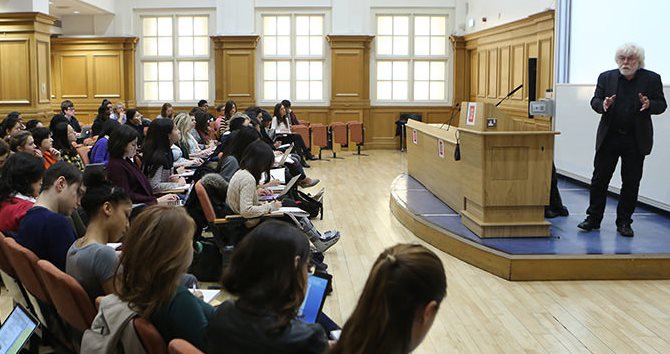As I mentioned in yesterday’s post, students are once again requesting that lecture notes be circulated in advance, something I have always resisted. Here is an attempt to explain (not least to myself) why I find this objectionable.

What exactly do you have when you have ‘the lecture notes’?
I must admit to a feeling of mystery about why students want lecture notes in the first place. What exactly do you have when you have them?
To begin with, there is no such thing as ‘the lecture notes’. What you get are my lecture notes. Don’t get me wrong, my lecture notes are fabulous. But they’re mine. They are, in effect, my speaking prompts, a list of things I may not remember when I’m standing in front of you, which I write down to avoid forgetting. They complement all the stuff in my head that, for whatever reason, I’m less likely to forget when I’m standing in front of you. As between the two, the latter tends to be more important. But that’s the stuff I don’t write down. So when you bring my lecture notes to class, what you have is a rough catalogue of aspects of the topic I consider less important.
The main point is that there is no such thing as ‘the lecture notes’ – master notes that work well for everyone. The relevant lecture notes are your lecture notes, processed by your brain for your brain. This is because, especially for Masters level work, each individual brings a different mix of knowledge, experience, beliefs and priorities into the lecture hall with them. You all take different notes, and well you should. Some of the things your professors say are obvious to you, and you don’t bother writing them down. Other things are interesting or mysterious, and you do write them down. This is exactly as it should be, and explains why reading through someone else’s notes can seem so frustrating. We’ve all had this experience at one time or another. Your brilliant classmate takes notes that bang on about things that don’t need recording, and then – suddenly – fall off a cliff into paragraphs or bullets that don’t connect, leaving huge gaps. That cliff is the divide between what she knew and didn’t know walking into the lecture hall. It’s different from your divide. You and she know different things, you care about different things, and you take different notes. If you missed a lecture, by all means get her notes. But don’t pretend they substitute for your notes. They never will, and neither will mine.

Notes Are Irrelevant, Learning is Hard
The thing about notes – and this is the best part – is that they work by making themselves irrelevant. It’s a bit like ‘the best rules rarely need to be enforced’. The importance of notes isn’t in the notes. The importance of notes is in taking the notes, meaning you went to the lecture, listened, engaged with original material in your own particular way, filtered the lecture through everything you know, believe, etc., and then wrote down an account of the material that is coherent and prioritizes what, for you, is most important. If you did all of that, and did the readings, and then reflected on both, you went most of the way towards learning the material. You may refer back to your notes later, as a reference, like you look up a word to make sure you know what it means. But not because the knowledge is in the notes. It’s not. It’s in your head. Which is the only place it can be useful.
I’ve had the privilege to teach here for nearly two decades. And so I know LSE students are a small sub-sub-sub group of the population, and are really smart. But I do sometimes wonder if somehow, subconsciously, students want lecture notes as a shortcut to knowledge. Because in the consumer culture, knowledge acquisition is somehow analogous to downloading a document or an app. If you have ‘the lecture notes’, then you somehow have knowledge.

This is completely wrong. The correct analogy is physical training. Like mastering a sport, acquiring knowledge is hard work. It takes a lot of effort. It’s no joke that our brains account for something like 20% of the body’s energy consumption. Like a good workout, learning is hard and often painful. By itself, that no doubt explains much student frustration this time of year. The problem is, downloading notes doesn’t help much. It doesn’t get you knowledge. All you have when you have my notes is a small pile of paper.
My fear is that circulating lecture notes in advance gives students a false security that they ‘have’ the material, and so don’t need to work so hard to learn it. When I sit amongst students during a colleague’s lecture, I often see them scrolling through lecture slides, taking a few notes in the margins. It’s possible that the information is being assimilated in some ordered way. But it’s also possible that such students are coasting, disengaged, secure in the belief that they have the notes. The danger is that they coast straight through to the final exam, where they’ll be faced with another small pile of papers, all of them blank.
Smaller Considerations
Not less important, just more specific. Many of our lectures contain graphs, charts, and tables that students needn’t try to reproduce by hand. We have always circulated all such figures after the lecture, allowing students to focus on the main ideas and insights.
Any students with specific needs can of course request, and receive, lecture notes in advance.
Lastly, in my first year in this department, our then-Head warned that pre-circulating lecture notes increased the probability that students skipped lecture and stayed in bed, especially between December and March. I never found out how well-founded this claim is, but the little economist in me suspects it’s true. I’d be grateful for empirical evidence one way or the other. If it is true, then the recent trend towards video recording all lectures must be exacerbating the problem.
Do you agree? Or have you had a different experience? Why do you find lecture notes useful? I’d be interested to hear you thoughts.






Lecture notes given ahead of the lecture are good specifically for an in-service class (crush program). Here students cover four-months’ material in three weeks. If the notes are handy well before the presentation, students digest it better than listening to the lecturer with blank minds. However, I think the regular students do not need these notes; they need to make their own relying on the lecturer’s presentation together with the reference books.
Circulating lecture notes in advance will continue to be invaluable until the technology for making required readings/resources accessible to all students is discovered. How many hard copies of well written textbooks are carried in the library? It’s a nightmare borrowing a book that is used in more than one class. Assuming you can, for how long can you keep it? Even books with electronic access sometimes require a wait-time if the momentary online-access-limit for a particular time is reached. In a 12-month long program where attention is split between taking a full course load, interviewing for career opportunities, and with a probability close to 1 of missing classes, amongst other commitments to the school community to keep a vibrant student body, excellent lecture notes can help both the professor and the students vet their ideas and clear any fuzzy understanding of class topics/discussions. For professors beforehand and for students both before and after the fact. Second-guessing how students might use or abuse lecture notes appears to me a futile task.
This debate might have been decided. Precisely why LSE charges £20,000 for a 12-month program. Clearly, a stronger incentives for the buyer to get value for the time spent at the LSE. A lot more potent than any decision not to circulate class notes or to do so after the fact.
Smart to keep an eye on what competition is doing too. With the proliferation of high-quality free online classes with detail notes and recorded classes such as edx.org where one can chose to learn anything and at their own pace, what is the value proposition for paying £20,000 to come to a class and listen to a professor speak from memory for about one to two hours to an oversize class with short-attention span and with insufficient time for each student to ask questions she/he might have?